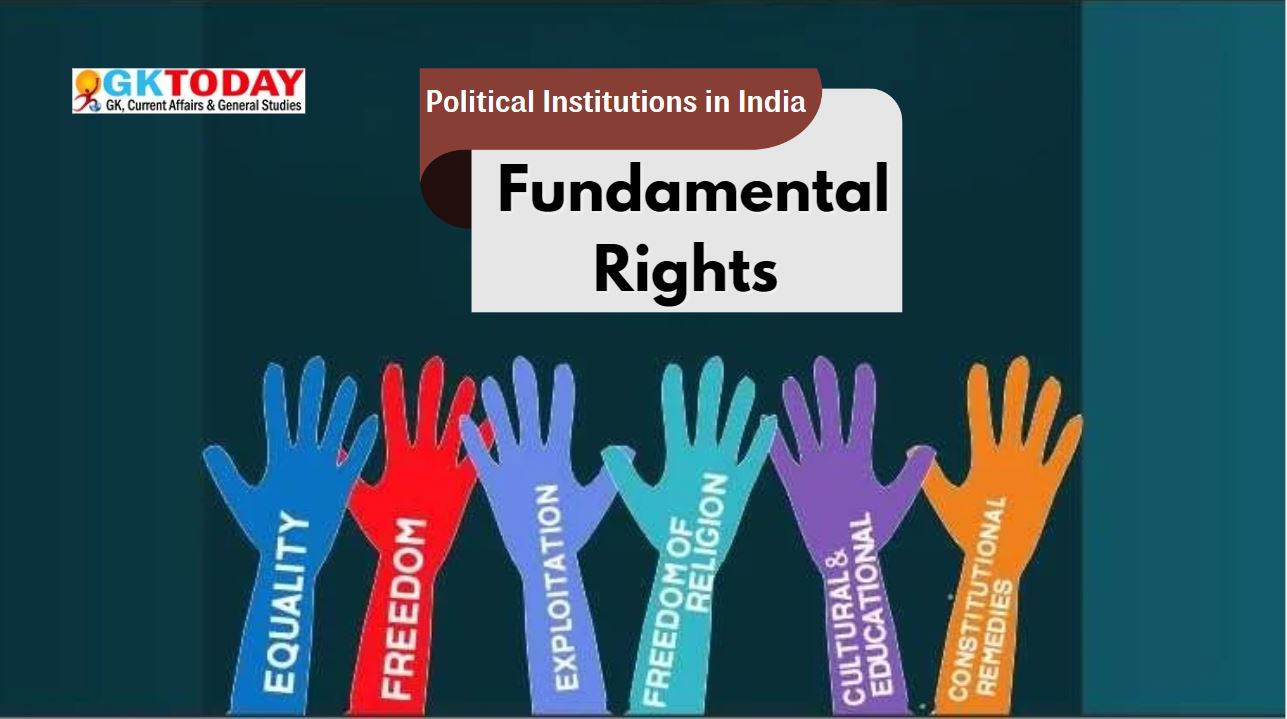Fundamental Rights in India [UGC-NTA NET Political Science]
Fundamental Rights are a collection of rights guaranteed to all citizens of India. They are outlined in Articles 12 to 35 of the Constitution. These rights are designed to protect individuals from arbitrary actions by the state and to ensure their freedom and dignity.
Purpose of Fundamental Rights
The primary purposes of Fundamental Rights include:
- Ensuring individual freedom and dignity.
- Protecting citizens against arbitrary actions by the state.
- Promoting social justice and equality.
Classification of Fundamental Rights
Fundamental Rights can be classified into six major categories:
Right to Equality (Articles 14-18)
This category ensures equality before the law. Key articles include:
- Article 14: Guarantees equality before the law and equal protection of the laws.
- Article 15: Prohibits discrimination on grounds of religion, race, caste, sex, or place of birth.
- Article 16: Ensures equality of opportunity in public employment.
- Article 17: Abolishes untouchability.
- Article 18: Abolishes titles, except for military and academic distinctions.
Right to Freedom (Articles 19-22)
This right encompasses various freedoms:
- Article 19: Protects rights related to speech, assembly, association, movement, residence, and profession.
- Article 20: Provides protection against ex post facto laws, double jeopardy, and self-incrimination.
- Article 21: Guarantees the right to life and personal liberty.
- Article 21A: Establishes the right to education, added by the 86th Amendment in 2002.
- Article 22: Offers protection against arbitrary arrest and detention.
Right against Exploitation (Articles 23-24)
This right focuses on preventing exploitation:
- Article 23: Prohibits human trafficking and forced labour.
- Article 24: Bans the employment of children in hazardous conditions.
Right to Freedom of Religion (Articles 25-28)
This right safeguards religious freedoms:
- Article 25: Guarantees freedom of conscience and the right to profess and propagate religion.
- Article 26: Allows individuals to manage their religious affairs.
- Article 27: Prohibits taxation for promoting any religion.
- Article 28: Ensures freedom from attending religious instruction in educational institutions.
Cultural and Educational Rights (Articles 29-30)
These rights protect minorities:
- Article 29: Protects the interests of minorities regarding culture, language, and script.
- Article 30: Grants minorities the right to establish and administer educational institutions.
Right to Constitutional Remedies (Article 32)
This right provides mechanisms for enforcement:
- Article 32: Allows individuals to approach the Supreme Court for enforcement of Fundamental Rights.
Enforcement of Fundamental Rights
Fundamental Rights are enforceable in courts. The Supreme Court and High Courts have the authority to issue writs to protect these rights. These writs include:
- Habeas Corpus
- Mandamus
- Prohibition
- Quo Warranto
- Certiorari
Limitations of Fundamental Rights
Fundamental Rights are not absolute. They are subject to reasonable restrictions. The state can impose limitations for various reasons, including:
- Sovereignty
- Integrity
- Security of the state
- Public order
- Morality
Amendments and Judicial Interpretation
Several amendments and landmark cases have shaped the interpretation of Fundamental Rights:
- The 42nd Amendment (1976) added “socialist” and “secular” to the Preamble, influencing the understanding of these rights.
- Kesavananda Bharati v. State of Kerala (1973): Established the Basic Structure Doctrine, asserting that certain fundamental features of the Constitution cannot be altered.
- Maneka Gandhi v. Union of India (1978): Expanded the interpretation of Article 21, emphasising the right to a fair procedure.
- Minerva Mills v. Union of India (1980): Reinforced the Basic Structure Doctrine, denoting the balance between Fundamental Rights and Directive Principles.
Comparison with Other Rights
Fundamental Rights differ from Directive Principles of State Policy:
- Fundamental Rights are justiciable, meaning they can be enforced in courts.
- Directive Principles are non-justiciable; they are guidelines for the state to follow.
Fundamental Duties
Fundamental Duties were added by the 42nd Amendment in 1976 and are outlined in Article 51A. These duties include:
- Promoting harmony and the spirit of common brotherhood.
- Safeguarding public property.
- Striving towards excellence in all spheres of individual and collective activity.
Significance of Fundamental Rights
Fundamental Rights are vital for the functioning of democracy. They empower citizens and provide a framework for protecting individual liberties. They ensure that the government remains accountable to the people.
Current Issues and Debates
Ongoing debates surround the balance between Fundamental Rights and national security. Recent discussions focus on expanding rights, such as:
- The right to privacy, brought into light in Justice K.S. Puttaswamy v. Union of India (2017).
- Concerns regarding the impact of laws on individual freedoms.
- Discussions on the implications of technology on privacy rights.


